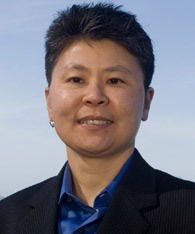QWOC Film Festival Focuses on the Immigrant Experience

Produced by filmmaker Madeleine Lim, herself an immigrant from Singapore, the San Francisco festival gives newly trained queer women of color a showcase for their short films—and also feeds into the larger Frameline festival, which begins this week.
Madeleine Lim believes film is too powerful a medium to be left in the hands of white men.
“Emotions get magnified on screen,” she says. “We know this. Politicians win elections with airtime. Corporations sell millions of dollars of products with commercials. Film can make us cry, laugh and think.”
In 2000, Lim, a filmmaker who left her native Singapore when she was 23, founded the Queer Women of Color Media Arts Project (affectionately known as QWOCMAP) in San Francisco. She started training women in filmmaking, and five years ago started the Queer Women of Color Film Festival, where the women show the shorts they have created.
Lim, a former community organizer, sees the festival as a way to build community and inspire activism. The training classes and the festival are free, and other organizations are invited to come, mingle at the receptions and participate on panels.
T. Kebo Drew, a staff member of QWOCMAP, thinks bringing people together is one of the most important parts of the festival.
“Both my parents fought for civil rights,” she says. “When people would get together, often there’d be singing, which gave people a sense of hope and strength. That’s what art can do.”
“With film you can reframe the issue,” said Lim, following a screening of shorts and a panel on queer immigration, the theme of this year’s three-day festival (June 12 to 14). “You can put a human face on it. We could have just done the panel without the films, but that’s abstract. Those films were personal stories, so people realize when we talk about immigration, we’re talking about people. We’re deconstructing stereotypes.”
Lim says it’s important to her that both the festival and the training are free.
“At QWOCMAP, we’re committed to social justice,” she says. “Our 16-week training program is completely free. Anywhere else it would cost between $1000 and $2000. We need to give people opportunities. In L.A. film is very male dominated, and we need extra money—not even to get the playing field level, because that is so far, but just so we have a shot at a playing field. If we don’t make films of our lives, who will?”
Since the festival started, QWOCMAP has been doing programming for the Frameline LGBT Film Festival, the oldest and largest of its kind.
“A lot of festivals find us kind of a one-stop shop,” Lim says. “We create the filmmakers and the films and we program films around an issue.”
This year the issue at the Frameline festival is journeys, and on June 21 five of the shorts made in Lim’s classes will screen in a program called “Blazing Wanderlust.”
Jennifer Morris, the festival director, says the selection of movies from Lim is diverse, touching and funny. She’s excited to get them out to a larger audience through Frameline.
“The voices you hear in these films are not voices you hear on TV and not even at other film festivals, to tell you the truth,” she says.
“It’s very hard to find queer work by women of color because it’s very hard to find funding, but I think it’s important to be committed to featuring diverse voices.”
One of those voices belongs to Punam S., who made Mr. and Mrs. Singh, a takeoff on Mr. & Mrs. Smith with Angelina Jolie and Brad Pitt. The Frameline catalogue describes it as a story where a “star-crossed South Asian couple traverses the treacherous terrain between duty and desire.”
“It’s not hugely deep,” Punam S. says. “I wanted to make a movie about a marriage of convenience and make it funny and fun.”
A marketing consultant, Punam S. says she’d never done anything like this, but she loved the class, which she calls one of the most intense experiences of her life.
“I feel like Madeleine got the best out of me,” she says. “She really shows you how to take an idea and turn it into a script and develop a screenplay.”
Punam S. has always loved movies and she says she’s thrilled to tell a story about gay South Asians.
“I think film’s the best medium to communicate anything,” she says. “I feel like I want to tell stories in the most appealing, visual way.”
More articles by Category: Arts and culture, LGBTQIA
More articles by Tag:



























